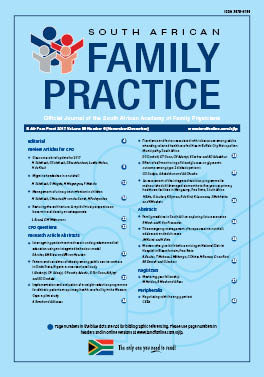Effect of self-monitoring of blood glucose on glycaemic outcome among type 2 diabetic patients
Keywords:
Diabetes Mellitus, Self monitoring of Blood Glucose, Glycosylated Haemoglobin, Fasting Blood glucose
Abstract
Background: Diabetes mellitus is a chronic metabolic disorder which leads to complications especially when not properly managed. The role of self-monitoring of blood glucose (SMBG) in type 2 diabetic patients using oral hypoglycaemic agents has been a source of controversy. Objective: The objective was to study the effect of SMBG on glycaemic outcome among type 2 diabetics in a primary care setting. Methodology: A randomised control study was conducted between March 2013 and November 2013 at the General Outpatient Clinic of the Family Medicine Department (FMD) in Lagos State University Teaching hospital. A total of 120 diabetic patients were randomised into intervention and control groups; 107 patients (55 in the intervention and 52 in the control group) completed the study. Intention-to-treat analysis was done. Chi-square, Students t- and paired t-test were used to determine variables significantly associated with SMBG. Results: More than three-quarters (77.5%) of the participants were aware of SMBG prior to commencement of the study. Both the SMBG (8.7% vs. 7.2%; p-value < 0.001) and non-SMBG (8.7% vs 7.7%; p-value < 0.001) groups had a significant improvement in HbA1c at the end of the study. Similarly there was a significant improvement in FBG among both groups (SMBG 153 mg/dl vs. 123 mg/dl; p-value < 0.001 and non-SMBG (158 mg/dl vs. 137 mg/dl; p-value 0.022). The HbA1c at the end of the study was 7.2% for the SMBG vs 7.7% for the non-SMBG group with no statistical difference (p-value 0.174). Conclusion: The use of SMBG among type 2 DM patients did not result in better glycaemic control compared with patients who did not practise SMBG. It could be due to close follow-up and education of both groups. (Full text of the research articles are available online at www.medpharm.tandfonline.com/ojfp) S Afr Fam Pract 2017; DOI: 10.1080/20786190.2017.1340250
Published
2017-12-05
Section
Research Articles
By submitting manuscripts to SAFP, authors of original articles are assigning copyright to the South African Academy of Family Physicians. Copyright of review articles are assigned to the Publisher, Medpharm Publications (Pty) Ltd, unless otherwise specified. Authors may use their own work after publication without written permission, provided they acknowledge the original source. Individuals and academic institutions may freely copy and distribute articles published in SAFP for educational and research purposes without obtaining permission.

